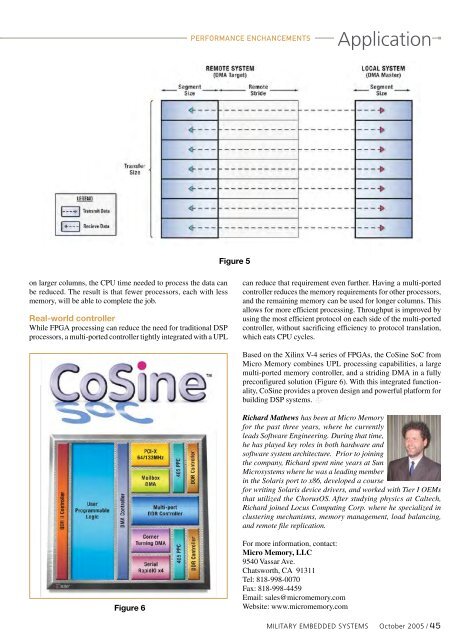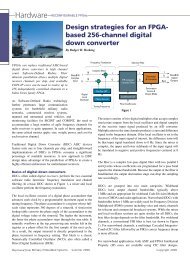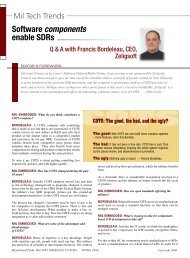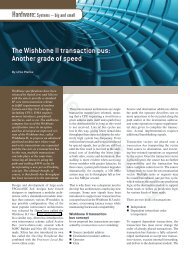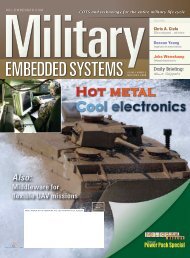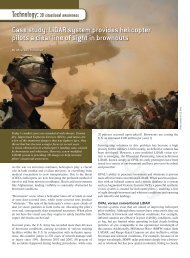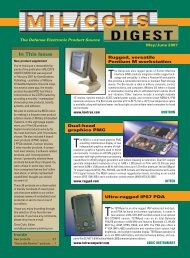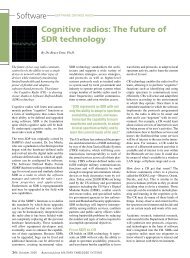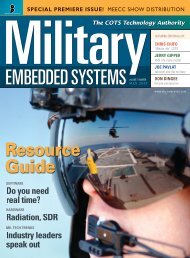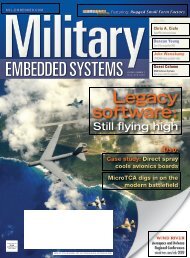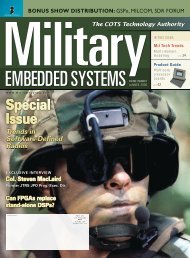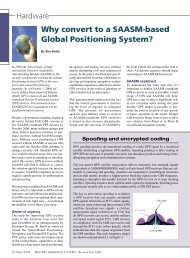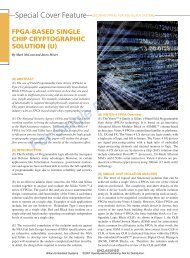Military Embedded Systems - Fall 2005 - Volume 1 Number 2
Military Embedded Systems - Fall 2005 - Volume 1 Number 2
Military Embedded Systems - Fall 2005 - Volume 1 Number 2
Create successful ePaper yourself
Turn your PDF publications into a flip-book with our unique Google optimized e-Paper software.
Performance enchancements<br />
Application<br />
Figure 5<br />
on larger columns, the CPU time needed to process the data can<br />
be reduced. The result is that fewer processors, each with less<br />
memory, will be able to complete the job.<br />
Real-world controller<br />
While FPGA processing can reduce the need for traditional DSP<br />
processors, a multi-ported controller tightly integrated with a UPL<br />
can reduce that requirement even further. Having a multi-ported<br />
controller reduces the memory requirements for other processors,<br />
and the remaining memory can be used for longer columns. This<br />
allows for more efficient processing. Throughput is improved by<br />
using the most efficient protocol on each side of the multi-ported<br />
controller, without sacrificing efficiency to protocol translation,<br />
which eats CPU cycles.<br />
Based on the Xilinx V-4 series of FPGAs, the CoSine SoC from<br />
Micro Memory combines UPL processing capabilities, a large<br />
multi-ported memory controller, and a striding DMA in a fully<br />
preconfigured solution (Figure 6). With this integrated functionality,<br />
CoSine provides a proven design and powerful platform for<br />
building DSP systems.<br />
Richard Mathews has been at Micro Memory<br />
for the past three years, where he currently<br />
leads Software Engineering. During that time,<br />
he has played key roles in both hardware and<br />
software system architecture. Prior to joining<br />
the company, Richard spent nine years at Sun<br />
Microsystems where he was a leading member<br />
in the Solaris port to x86, developed a course<br />
for writing Solaris device drivers, and worked with Tier I OEMs<br />
that utilized the ChorusOS. After studying physics at Caltech,<br />
Richard joined Locus Computing Corp. where he specialized in<br />
clustering mechanisms, memory management, load balancing,<br />
and remote file replication.<br />
Figure 6<br />
For more information, contact:<br />
Micro Memory, LLC<br />
9540 Vassar Ave.<br />
Chatsworth, CA 91311<br />
Tel: 818-998-0070<br />
Fax: 818-998-4459<br />
Email: sales@micromemory.com<br />
Website: www.micromemory.com<br />
<strong>Military</strong> EMBEDDED SYSTEMS October <strong>2005</strong> / 45


